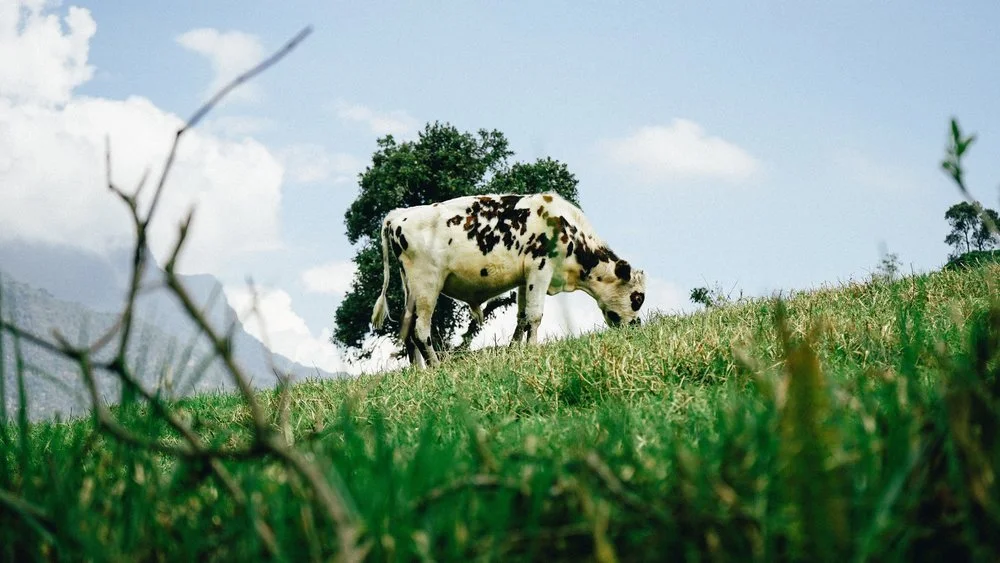Why Grass-Fed is Worth the Hype
Hope you're having a lovely July. It's pretty incredible how quickly the summer seems to go by compared to the winter. I've been soaking it up as much as I can! It's exciting to be able to eat my own fresh veggies from the garden or buy fresh-picked produce directly from farmers at the farmers market. I love that pasture-raised meats are also available at many of the markets.
I'm sure you've seen many headlines about pasture-raised or grass-fed meats in the news and the grocery stores in the past couple years. As with many things, it might seem like the latest craze that isn't going to last. However, there are many nutritional and environmental reasons why pasture-raised meats are truly better for us.
Why pasture-raised is worthy of the hype
Meat from pasture-raised animals contain 3-5x the normal amount of conjugated linoleic acid (CLA). This important antioxidant has been shown to help prevent cancer, heart disease, diabetes, and more.
There are higher amounts of omega-3 fats (the good fats!). These fats play a role in every cell and system in the body. You know those fish oil pills everyone takes? It's because of omega-3's.
Vitamins A and E (as well as many other vitamins and minerals) are higher in pasture-raised animals due to the animals eating the foods they were meant to consume.
Just like humans, animals store toxins in their fat. When they're heavily exposed to toxins from the foods they eat and the environments they live in, we end up eating those toxins. Conventionally-raised (factory-farmed) animals rely on grains for their diet. These grains are often heavily sprayed with RoundUp and other industrial chemicals. Conventionally-raised animals are also injected with steroids and antibiotics, which are compounds we indirectly get from their meat.
Pasture-raised animals are also better for the environment. I'm sure you're aware of how bad it smells when you drive by a factory farm. There isn't anything bad to smell when you drive by a farm where animals are pasture-raised. Their waste goes into the ground and enriches the soil instead of producing excess methane gas in a cesspool of waste on a factory farm.
It's more humane. Cows, pigs, and chickens live as they were designed to with space to roam around. They get to play, soak up the sun, lay in the grass and eat their native foods. Some farms even strive to kill animals in their natural environment to evoke the least amount of stress possible.
Pasture-raised is better for the animal and ultimately better for you.
How to keep the cost down
Pasture-raised meats are definitely more expensive than factory-farmed. The animals require a lot more land and often more time to grow than factory-farmed animals, but I’ve even gotten my dad to convert, who was raised on a semi-conventional dairy farm! There are ways to help bring the cost down so it's more affordable to eat regularly.
Check out Eat Wild, an online resource you can use to locate farms that sell pasture-raised meats across the US. You can often buy directly from the farmer.
Purchasing meat in larger quantities reduces your cost as well. It's been fairly easy to find groups of people to go in on a whole cow or pig with. 1/8 of a cow fits easily in a standard freezer.
Watch for sales and stock up. I belong to a co-op that has a big meat sale once a year. I get 3-4 months worth of meat at that sale because it's so much cheaper, sometimes 40% off per pound or more!
Starting slowly and buying it whenever you can is a good way to go. That's exactly how I got started.
In the end, we're healthier when the plants and animals we eat are healthier. I also like to think of buying pasture-raised meats and organic vegetables as voting with my dollar. Together, we can start to drive change in the food industry when we buy healthier, properly raised foods. For now, we'll be a bit healthier ourselves by eating this way and supporting local farmers at the same time.


